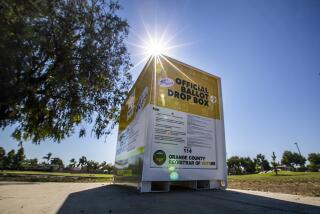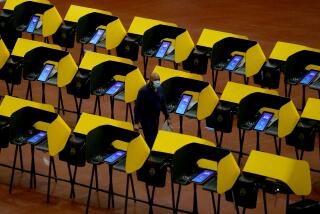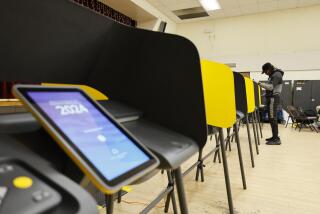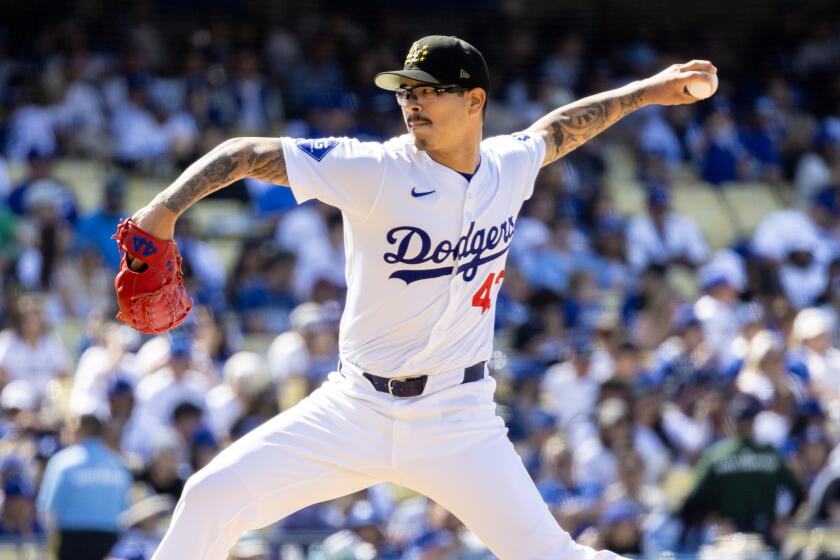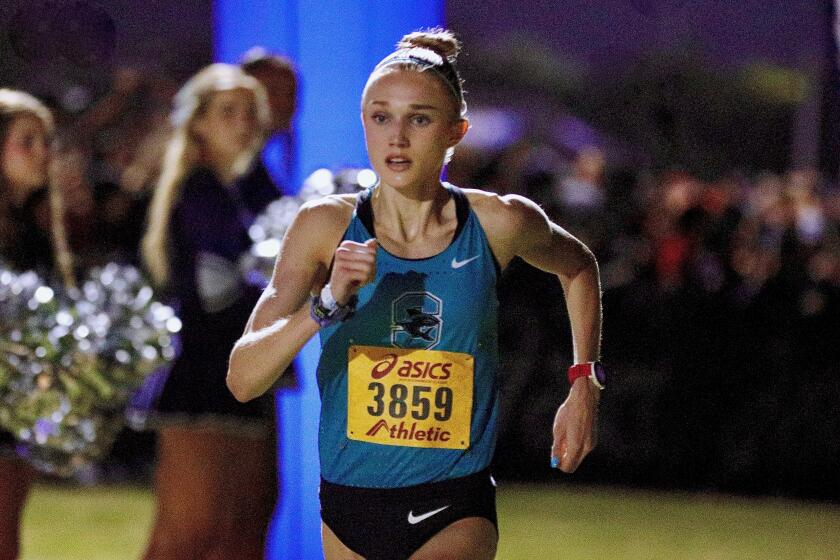In Calif., nonvoters express disgust
Since 1956, Robert Gamm had made the trek to the voting booth. He never missed a general election. He never missed a primary. Until Tuesday.
“I’m really disgusted,” said Gamm, 68, a retired public relations manager and Banana Republic clerk in the Fairfax district of Los Angeles. “In my lifetime in California, it’s the dirtiest campaign I’ve seen. I really don’t care at this point who is governor.”
Gamm joined thousands of other Californians -- old, young, laborer, professional, Democrat and Republican -- who abstained with a vengeance.
“It’s not apathy,” said Ivonne Mendoza, 25, a social worker from Pasadena who often votes for Green Party candidates. “It’s more of a form of protest.... I think it states that the issues I’m concerned about are not being spoken about.”
Most of those interviewed who withheld their vote Tuesday said they were repelled by the negative campaigning and lackluster appeal of Gov. Gray Davis and his Republican counterpart, Bill Simon. Others faced congressional contests rendered noncompetitive by incumbents safely ensconced in districts that Republican and Democratic legislators agreed on to maintain the balance of power.
“I’ve given up on the system, and I never thought I would say this,” said Gary Hodge, 61, of San Dimas. The salesman and marketing director said he had voted in every election since 1964, but stopped two years ago when he decided that the exercise was pointless.
A registered Republican for as long as he can remember, Hodge said he now believes that “our major party system is tweedledee and tweedledum.... I don’t think there’s any choices.”
If predictions hold true, the smallest portion of eligible voters in California history will have cast ballots statewide in this election -- fewer people by raw number than voted three decades ago, when the state’s population was about 40% smaller, according to some polls.
‘Why Go for Either?’
“The one guy, Simon, is a total business failure. So I don’t want to vote for him,” said Chris Asquith, 35, a data analyst from Riverside. “But the other guy, Davis, is just as bad. He blew it on energy. So why go for either one of them?”
Davis, the incumbent scarred by his handling of the energy crisis and his incessant campaign fund-raising, spent millions of dollars attacking Simon. The GOP challenger, meanwhile, committed embarrassing foibles while on the defensive. In the end, they tarred each other well enough to chase away Abraham Shamie, an 80-year-old from Brooklyn.
“They’re two thieves,” said Shamie, a retired dry-goods store owner and loyal Democrat who voted in the 2000 presidential election but stayed away Tuesday. “I see the commercials they put against each other. One is worse than the other.”
The rest of the ballot, Shamie said, was collateral damage in his war of principle against Davis and Simon -- a sentiment shared by many other nonvoters.
“When I got the [voter] book in the mail, I didn’t even read it,” Shamie said Tuesday as he munched on a doughnut at Farmers Market. “I took it and threw it in the garbage -- immediately.”
Nearby, Tommy Swerdlow, a 40-year-old screenwriter who grew up in a liberal household in New York, lamented his ignorance of ballot issues -- from billion-dollar school bonds to San Fernando Valley and Hollywood secession -- but said the governor’s race sapped his inspiration.
“The truth of the matter is: I wish I were a little more informed,” he said over lunch with his wife and 3-year-old son. “I would prefer to be better versed in the side issues and not just let my [lack of interest] in the governor’s race [destroy] my entire ability to have a voice.”
As Swerdlow mused over his shortcomings, Mayor James K. Hahn made a campaign swing through Farmers Market to push against secession.
Swerdlow didn’t recognize him. “I was wondering who that was,” he said.
Physician Sonny Lambert considers herself an informed voter. She was a campaigner for Proposition 187, the 1994 measure to withhold most public benefits from illegal immigrants. When it was overturned in the courts, she lost faith in California’s ability to decide public policy issues directly.
“I voted for 187, and the minute 187 was passed someone went to the judiciary system and had it overturned,” she said. “Once the people have spoken, that’s what should be law. This is what the country is founded on: what people choose, not what special interests want. Until that is addressed, then professional people like us will continue to be disgruntled.”
Even some who have adopted the United States and its system have also adopted the custom of not voting.
Argisht Minasyan, 23, a banker and naturalized citizen who gained the right to vote two years ago, didn’t cast his ballot Tuesday. “I don’t like the politics, basically people going at each other,” he said from a cafe table in downtown Los Angeles. “I don’t like Davis or Simon. I think we have two dweebs who don’t know what they’re doing.”
Sending a Message
Ody Ketch, a Turkish immigrant from Bellflower, said he has refused to vote since the late 1980s, when losing a personal lawsuit convinced him that the legal system was corrupt.
“There are several ways to express dissatisfaction,” the 66-year-old engineer said outside a Starbucks in Orange. “I can get a gun and be a cowboy. I’m taking a peaceful way to express my dissatisfaction. I won’t vote.”
This year’s contest pushed some habitual abstainers even further out of the electoral orbit.
Sam Gill, 56, said he expected more from political leaders in the year after the Sept. 11, 2001, attacks.
“I thought that our country was finally going to blossom forth and be an example to the world,” he said. “I was so naive. It seems to me that we’ve squandered all the goodwill of the world.”
He said he felt so voiceless that he couldn’t muster the will to vote.
“I’m not even a cog in the wheel,” Gill said. “I’m not even a cog. I’m a nothing. That’s the way I feel.”
Times staff writers Robin Fields, Jessica Garrison, Scott Gold, Jeff Gottlieb, Anna Gorman and Scott Martelle contributed to this report.
More to Read
Go beyond the scoreboard
Get the latest on L.A.'s teams in the daily Sports Report newsletter.
You may occasionally receive promotional content from the Los Angeles Times.
